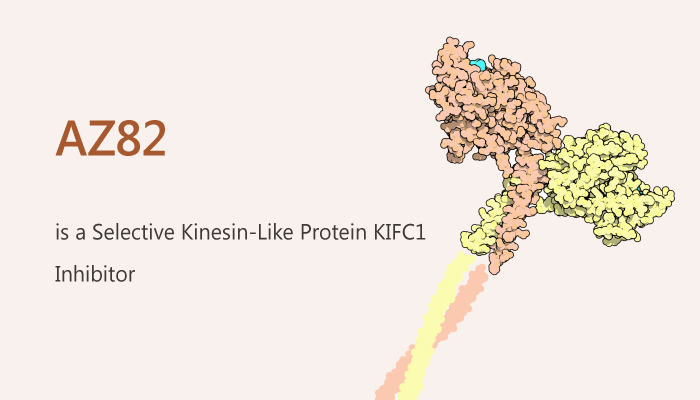A study from Jiaquan Wu discovered and identified a KIFC1 inhibitor AZ82.

Centrosome amplification occurs in many human cancers and has become a driver of both genetic instability and tumorigenesis. Cancer cells have evolved mechanisms to bundle multiple centrosomes into two spindle poles to avoid multipolar mitosis that can lead to chromosomal segregation defects and eventually cell death. KIFC1, a kinesin-14 family protein, plays an indispensable role in centrosomal bundling in cancer cells. However, but its function is not required for normal diploid cell division. And this features suggested that KIFC1 is an attractive therapeutic target for human cancers.
AZ82 bound specifically to the KIFC1/microtubule (MT) binary complex and inhibited the MT-stimulated KIFC1 enzymatic activity in an ATP-competitive and MT-noncompetitive manner with a K<sub>i</sub> of 43 nM. AZ82 also effectively engaged with the minus end-directed KIFC1 motor inside cells to reverse the monopolar spindle phenotype induced by the inhibition of the plus end-directed kinesin Eg5.
Additionally, AZ82 specifically induced multipolar spindles in BT-549 cells, but not in cancer cells with normal centrosome number, such as HeLa. Furthermore, AZ82 bound specifically to KIFC1/MT complex but not to KIFC1 or MT alone. Treatment with AZ82 caused centrosome declustering in BT-549 breast cancer cells with amplified centrosomes. AZ82 inhibits both processes with an IC<sub>50</sub> of 0.90 ± 0.09 μM for mant-ATP binding and 1.26 ± 0.51 μM for mant-ADP releasing.
Now, we all know that AZ82 can effectively inhibit KIFC1 function in cells. The authors anticipate that KIFC1inhibitors may have a greater therapeutic margin than inhibitors for other kinesins.
Reference:
- Wu J, et al. Discovery and mechanistic study of a small molecule inhibitor for motor protein KIFC1. ACS Chem Biol. 2013 Oct 18;8(10):2201-8.
- Godinho SA, et al. Causes and consequences of centrosome abnormalities in cancer. Philos Trans R Soc Lond B Biol Sci. 2014 Sep 5;369(1650).